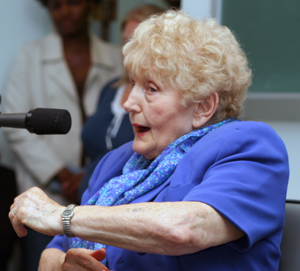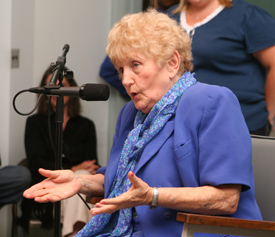 Holocaust Survivor Eva Mozes Kor refuses to be a victim, although she has plenty of reason to take that route.
Holocaust Survivor Eva Mozes Kor refuses to be a victim, although she has plenty of reason to take that route.
Kor delivered a lecture to an overflowing crowd in the George D. Lovell Lecture Room Wednesday night. History Professor Stephen Morillo introduced the speaker and thanked Gina Bowman and Jerry Bowie for organizing the event. With an overflow audience of students, faculty members, administrators, and local citizens, Mrs. Kor spoke to the hushed audience bout how she survived Dr. Josef Mengele’s experiments at Auschwitz Concentration Camp and how the experience has helped her develop life lessons.
Kor opened the talk with a humorous anecdote.
"I’m pleased to be here," she said. "I had dinner with the Dean and I really liked him. I have forgotten his name."
The crowd erupted with laughter as Kor broke the ice. The lighthearted opening quickly changed to reverence as she recounted the story of her imprisonment at the hand of the Nazis. The ten-year old and her family arrived at Auschwitz in a cattle car, and within 30 minutes Eva and her twin sister Miriam had been separated from their mother, father, and two older sisters.
"The Nazis pulled my mother in one direction and pulled us in another direction," said Mrs. Kor, who added she never saw her parents again. "I always wished I had the courage run back to her."
Eva and Miriam were processed into the camp, taken to a barrack, and tried to sleep that night. Rats were keeping Eva awake so she went to the latrine where she saw the scattered corpses of three naked children. Their eyes were wide open, looking up at her.
 "I realized this could happen to me too," she said. "And I made a silent pledge that Miriam and I would not end up on that filthy latrine floor."
"I realized this could happen to me too," she said. "And I made a silent pledge that Miriam and I would not end up on that filthy latrine floor."
From that moment on, Eva acted instinctively in ways that would keep her and her sister alive. She would have a lot of work to do because she and all the twins at Auschwitz were to be used as guinea pigs for Dr. Mengele’s experiments. Three days a week, she said, they were placed in a room, naked, for six to eight hours and measured head to toe. Another three days a week, they were taken to a blood lab and had blood taken away from the left arm and an unknown substances injected in their right arm. These injections made Eva very sick, and Dr. Mengele gave her two weeks to live. She was given no food or medicine, but Eva refused to succumb. She recovered and returned to the barracks.
One of Eva’s pastimes at Auschwitz was watching American airplanes fly over. She reasoned that they were the good guys. As the number of planes increased, the number of experiments decreased and the camp was liberated in January 1945.
"I thought everything would go back to how they were before," Kor said. "I was a naive little girl. Things could never be how they were before."
Kor’s trials led her to three life lessons. The first was to never give up. When she started lecturing in 1978, people would ask her about the experiments that she had tried to block out. In response she began sending letters to different media outlets to help her find other Mengele twins. By 1981, she had 500 media contacts. By 1983, she had the idea to start an organization to help survivors find each other to raise her profile so that she carried more clout.
The second lesson was about hate and prejudice.
"I, Eva Mozes Kor, survivor of prejudice, am prejudice when I see young men with pony tails, earrings, and anyone with tattoos and baggy pants," Mrs. Kor said. "Even I have to take the time to get to know the person."
Although her first reaction was to assume that people who look a certain way are bad people, she realized that the assumption was not necessarily accurate. She shared an analogy that she shared with another student at a previous lecture: imagine that every person’s action is a pebble dropped into the water. The ripples that form touch each other. Everything we do in our lives touches the lives of other people, she said. And if people judged each other by their actions and not assumptions, the world would be a better place.
The final lesson was healing herself by forgiving everybody. After her sister died in 1993 from kidney failure connected to the drugs given to her at Auschwitz, Mrs. Kor met a Nazi doctor to try to understand Mengele’s experiments. Dr. Hans Munch could not help her with that information, but his kindness to her and the suggestion of a former English professor prompted her to publicly forgive him and Dr. Mengele at the 50th anniversary of her liberation.
"I, the victim of Auschwitz, figured out that I had the power to forgive," Mrs. Kor said. "No one could give it to me and no one could take it away. I, the little guinea pig, had the power to forgive the God of Auschwitz. I immediately felt the pain lift from my shoulders. Finally I was no longer a prisoner of Auschwitz."
Mrs. Kor urged everyone to use this same power to make their lives and the lives of those around them better.
"After meeting with [Mrs. Kor] we decided she was very compelling and would definitely like to bring her here," said Center of Academic Enrichment Assistant Gina Bowman. "She is a part of the largest piece of history known to mankind. She survived near death and experienced testing done by Dr. Mengele. Her story of forgiveness and living her life here in America is like no other. An experience like this does not happen very often and the survivors are dying everyday."
"I think it was very interesting," said Filip Lempa ’11, an international student from Poland. "Especially because I have been to Auschwitz and read a book about Dr. Mengele. I had no idea that she was going to have as many pieces of advice about prejudice and never giving up. I didn’t know why she refused to answer questions."
"It was a good eye-opening experience," said Saidel Mayer ’10, an international student from Afghanistan. "I actually realized what happened. It’s different from reading it in a book. When you listen to someone who’s lived it, it’s really affecting."
"I thought it was very informative," sad Heather Olin from Ladoga. "To have someone who lives this close even and so humorous. The ripples in the water were a very good visual. Everyone needs to listen to that."
"I thought she was fascinating, witty, and strong," Alice Phillips said. "She is a good story teller. I think [her notion of forgiveness] is one of those well-thought out and sensible meanings of forgiveness. It makes me think of what forgiveness really means. I don’t think many people could do that – to take back power of their own lives."